#civilized people
Text
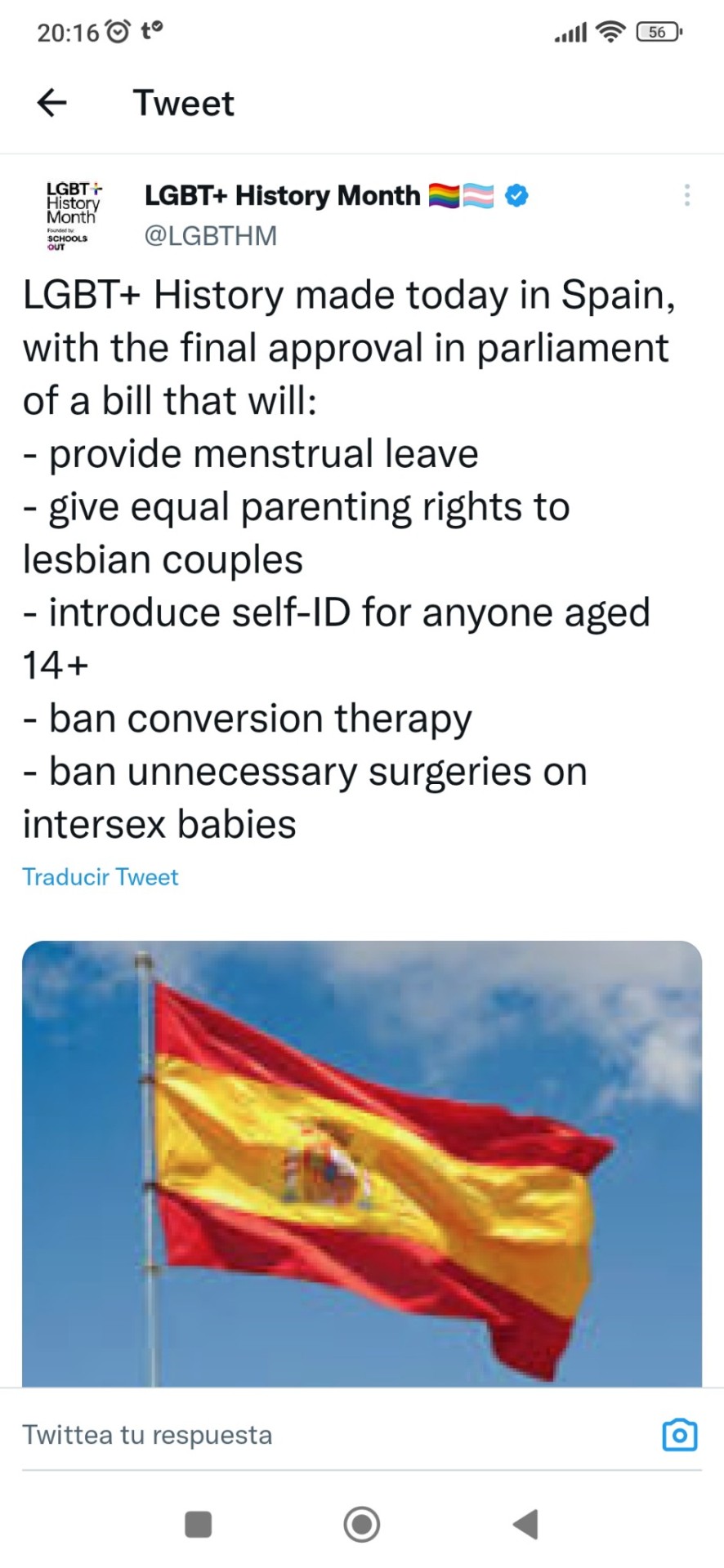
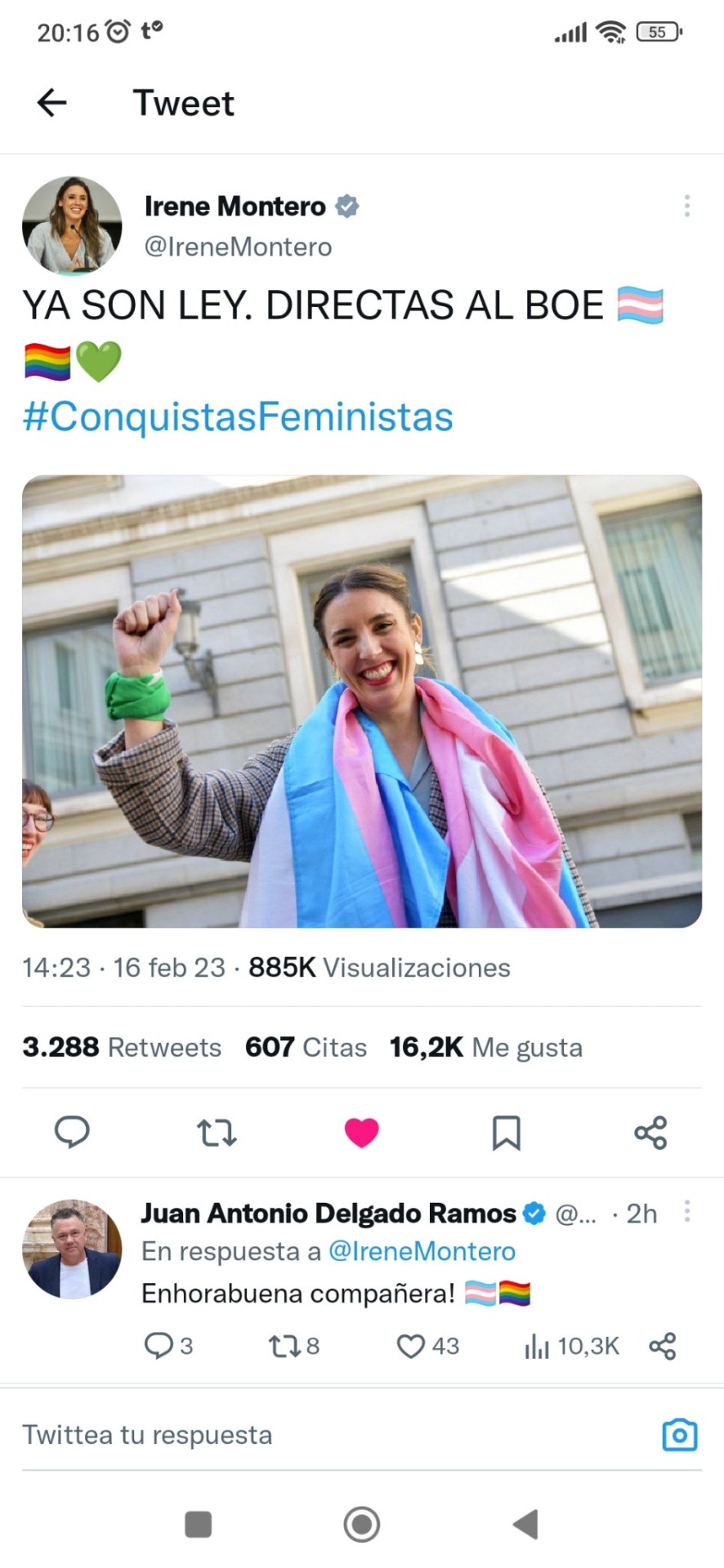
some good news!! the spanish state's ministry of equality has finally passed one of the most progressive trans laws on the planet, shielded free and universal access to abortion and banned conversion therapy and genital surgery for intersex babies, among a lot of other feminist policies. the minister of equality irene montero gave a speech thanking spain's lgtb and trans associations for helping her draft these legislations. couldn't be more proud!!
#spain#trans#ill always prioritize queer&trans revolution over reformism but man. man these are good news#these are gonna make people's life so much more comfortable#i was lucky enough to live in andalucia where we have THEE most advanced regional legislation on trans rights#so i didnt have to fight too many people to access hrt and to change my name on legal docs#but other ppl on the spanish state have been suffering so fucking much#and yeah this law doesnt cover non binary people or migrants but the door is fucking open. its a step forward#and after this terrible terrible week#after the antitrans antisemite game & brianna's murder and so many rampant transphobia#it feels nice to get a win#to have someone in power be so unwaveringly supportive#the queer community in the spanish state is NEVER gonna forget this. never#anyways!!!#felicidades gente trans española!!!! nos vemos en el registro civil dkkskdkkdkxkdk#mine
19K notes
·
View notes
Text
civilty in US politics is fu*cking bonkers man you can have a preacher at a town hall calmly calling for gays to be publicly executed but if a politician responds to him “FUCK YOU” that politician would be the subject of a week-long tirade about some bullshit “this is a dark day in american history. i cannot believe a politician would say the f word. we are a country of people who respect others’ opinions uwu”
50K notes
·
View notes
Text

For the ppl in the back!!
#black tumblr#black history#black literature#black excellence#black community#civil rights#black history is american history#civil rights movement#equality#equal rights#black lives matter#black pride#black people#equal#african slavery#american slavery#african american history#american history
2K notes
·
View notes
Text
Very interesting to me that a certain subset of the BES fandom's favourite iterations of Mizu and Akemi are seemingly rooted in the facades they have projected towards the world, and are not accurate representations of their true selves.
And I see this is especially the case with Mizu, where fanon likes to paint her as this dominant, hyper-masculine, smirking Cool GuyTM who's going to give you her strap. And this idea of Mizu is often based on the image of her wearing her glasses, and optionally, with her cloak and big, wide-brimmed kasa.
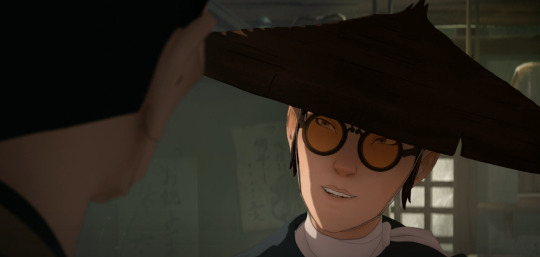

And what's interesting about this, to me, is that fanon is seemingly falling for her deliberate disguise. Because the glasses (with the optional combination of cloak and hat) represent Mizu's suppression of her true self. She is playing a role.

Take this scene of Mizu in the brothel in Episode 4 for example. Here, not only is Mizu wearing her glasses to symbolise the mask she is wearing, but she is purposely acting like some suave and cocky gentleman, intimidating, calm, in control. Her voice is even deeper than usual, like what we hear in her first scene while facing off with Hachiman the Flesh-Trader in Episode 1.
This act that Mizu puts on is an embodiment of masculine showboating, which is highly effective against weak and insecure men like Hachi, but also against women like those who tried to seduce her at the Shindo House.
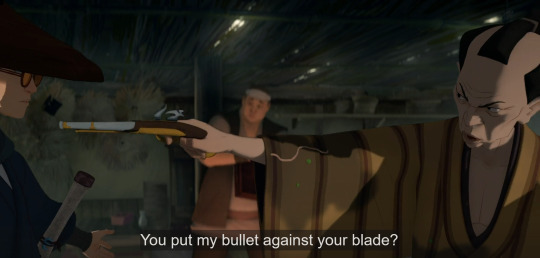

And that brings me to how Mizu's mask is actually a direct parallel to Akemi's mask in this very same scene.
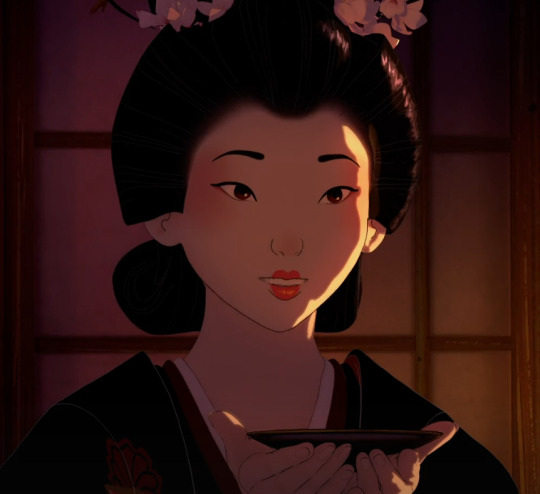
Here, Akemi is also putting up an act, playing up her naivety and demure girlishness, using her high-pitched lilted voice, complimenting Mizu and trying to make small talk, all so she can seduce and lure Mizu in to drink the drugged cup of sake.
So what I find so interesting and funny about this scene, characters within it, and the subsequent fandom interpretations of both, is that everyone seems to literally be falling for the mask that Mizu and Akemi are putting up to conceal their identities, guard themselves from the world, and get what they want.
It's also a little frustrating because the fanon seems to twist what actually makes Mizu and Akemi's dynamic so interesting by flattening it completely. Because both here and throughout the story, Mizu and Akemi's entire relationship and treatment of each other is solely built off of masks, assumptions, and misconceptions.
Akemi believes Mizu is a selfish, cocky male samurai who destroyed her ex-fiance's career and life, and who abandoned her to let her get dragged away by her father's guards and forcibly married off to a man she didn't know. on the other hand, Mizu believes Akemi is bratty, naive princess who constantly needs saving and who can't make her own decisions.
These misconceptions are even evident in the framing of their first impressions of each other, both of which unfold in these slow-motion POV shots.
Mizu's first impression of Akemi is that of a beautiful, untouchable princess in a cage. Swirling string music in the background.
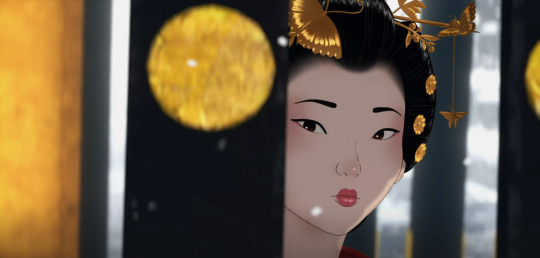
Akemi's first impression of Mizu is of a mysterious, stoic "demon" samurai who stole her fiance's scarf. Tense music and the sound of ocean waves in the background.

And then, going back to that scene of them together in Episode 4, both Mizu and Akemi continue to fool each other and hold these assumptions of each other, and they both feed into it, as both are purposely acting within the suppressive roles society binds them to in order to achieve their goals within the means they are allowed (Akemi playing the part of a subservient woman; Mizu playing the part of a dominant man).
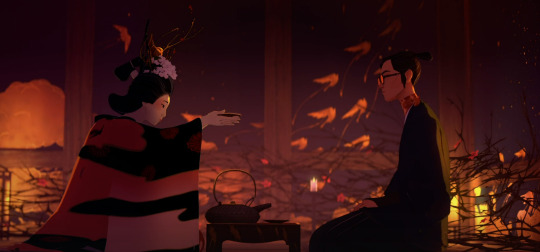
But then, for once in both their lives, neither of their usual tactics work.
Akemi is trying to use flattery and seduction on Mizu, but Mizu sees right through it, knowing that Akemi is just trying to manipulate and harm her. Rather than give in to Akemi's tactics, Mizu plays with Akemi's emotions by alluding to Taigen's death, before pinning her down, and then when she starts crying, Mizu just rolls her eyes and tells her to shut up.
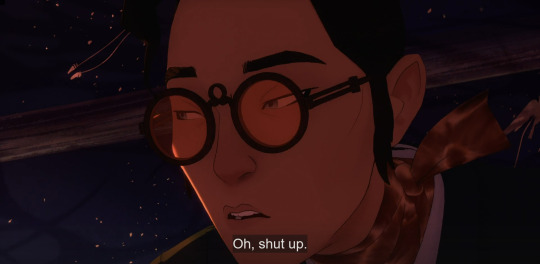
On the opposite end, when Mizu tries to use brute force and intimidation, Akemi also sees right through it, not falling for it, and instead says this:
"Under your mask, you're not the killer you pretend to be."
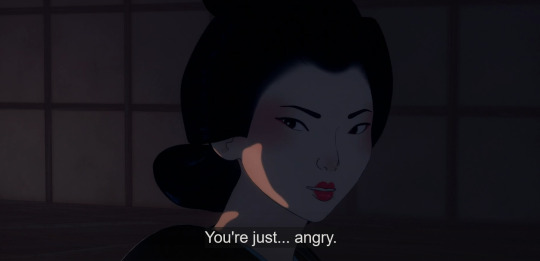
Nonetheless, despite the fact that they see a little bit through each other's masks, they both still hold their presumptions of each other until the very end of the season, with Akemi seeing Mizu as an obnoxious samurai swooping in to save the day, and Mizu seeing Akemi as a damsel in distress.
And what I find a bit irksome is that the fandom also resorts to flattening them to these tropes as well.
Because Mizu is not some cool, smooth-talking samurai with a big dick sword as Akemi (and the fandom) might believe. All of that is the facade she puts up and nothing more. In reality, Mizu is an angry, confused and lonely child, and a masterful artist, who is struggling against her own self-hatred. Master Eiji, her father figure who knows her best, knows this.
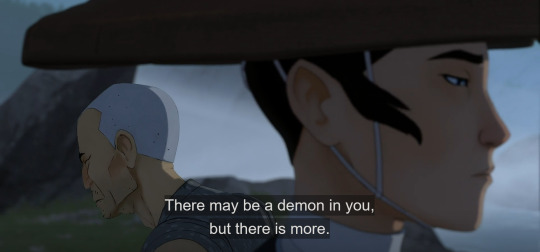
And Akemi, on the other hand, is not some girly, sweet, vain and spoiled princess as Mizu might believe. Instead she has never cared for frivolous things like fashion, love or looks, instead favouring poetry and strategy games instead, and has always only cared about her own independence. Seki, her father figure who knows her best, knows this.
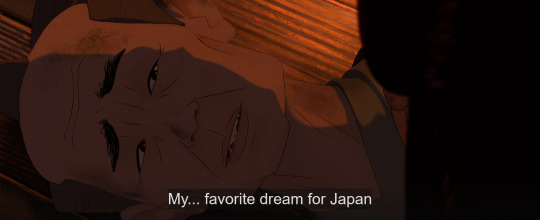

But neither is she some authoritative dominatrix, though this is part of her new persona that she is trying to project to get what she wants. Because while Akemi is willful, outspoken, intelligent and authoritative, she can still be naive! She is still often unsure and needs to have her hand held through things, as she is still learning and growing into her full potential. Her new parental/guardian figure, Madame Kaji, knows this as well.
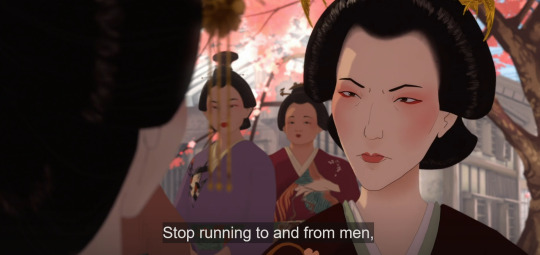
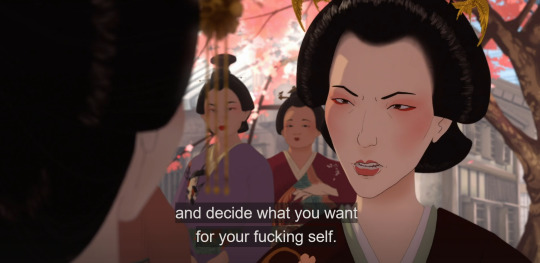
So with all that being said, now that we know that Mizu and Akemi are essentially wearing masks and putting up fronts throughout the show, what would a representation of Mizu's and Akemi's true selves actually look like? Easy. It's in their hair.
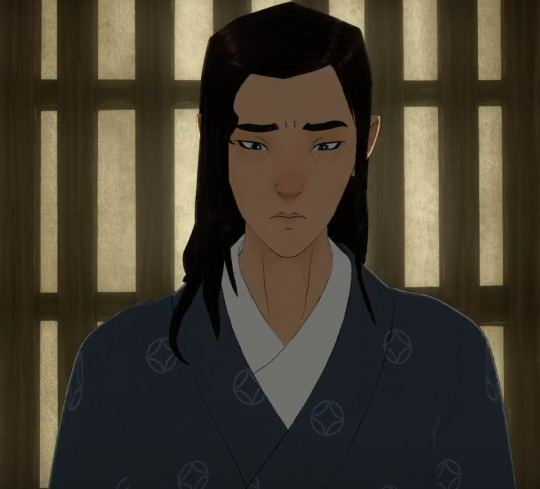

This shot on the left is the only time we see Mizu with her hair completely down. In this scene, she's being berated by Mama, and her guard is completely down, she has no weapon, and is no longer wearing any mask, as this is after she showed Mikio "all of herself" and tried to take off the mask of a subservient housewife. Thus, here, she is sad, vulnerable, and feeling small (emphasised further by the framing of the scene). This is a perfect encapsulation of what Mizu is on the inside, underneath all the layers of revenge-obsession and the walls she's put around herself.
In contrast, the only time we Akemi with her hair fully down, she is completely alone in the bath, and this scene takes place after being scorned by her father and left weeping at his feet. But despite all that, Akemi is headstrong, determined, taking the reigns of her life as she makes the choice to run away, but even that choice is reflective of her youthful naivety. She even gets scolded by Seki shortly after this in the next scene, because though she wants to be independent, she still hasn't completely learned to be. Not yet. Regardless, her decisiveness and moment of self-empowerment is emphasised by the framing of the scene, where her face takes up the majority of the shot, and she stares seriously into the middle distance.
To conclude, I wish popular fanon would stop mischaracterising these two, and flattening them into tropes and stereotypes (ie. masculine badass swordsman Mizu and feminine alluring queen but also girly swooning damsel Akemi), all of which just seems... reductive. It also irks me when Akemi is merely upheld as a love interest and romantic device for Mizu and nothing more, when she is literally Mizu's narrative foil (takes far more narrative precedence over romantic interest) and the deuteragonist of this show. She is her own person. That is literally the theme of her entire character and arc.
#blue eye samurai#mizu blue eye samurai#akemi blue eye samurai#blue eye samurai meta#just in case... im gonna tag this as#mizukemicritical#akemizucritical#though this post isnt actually criticising the ship itself but rather fanon's portrayal of the ship and the characters#for that reason lemme also tag this as#wank.mp3#feel free to disagree of course but please be civil#and if you need to rant about how wrong i am without any convincing evidence kindly feel free to make your own post. peace and love <3#fandom.rtf#meta dissertations.pdf#shut up haydar#edit: for full disclosure. i do rather dislike this ship. but obviously it's fine for anyone to enjoy it. please do! have your fun!#it's just that as usual! popular fanon and fandom around a ship is what has completely deterred me from any sense of enjoyment of it#it's a shame too because i was very open and even eager for some mizu/akemi romance in the future#but out-of-character fanon + the rudeness of certain fans has definitely soured it for me#but that doesn't mean people can't enjoy it obviously! ship and let ship!!!#plus it has its appeal which i DO STILL see and enjoy!!!!#i would even go as far as to call them soulmates because their narratives and characters are LITERALLY intertwined!!!#but. yeah. my gradual distaste for this ship is indeed very unfortunate.
662 notes
·
View notes
Text
The thing about Captain America: Civil War is that it's part of a trilogy about one specific man named Steve Rogers. Therefore it is supposed to be about Steve Rogers and primarily from his perspective.
It's the episode right after CATWS, and the story is supposed to directly tie in with the events of CATWS. It's hilarious (= enraging) how people just seem to conveniently overlook that little detail while talking about (or rather, shitting on) Steve's decisions and actions.
When you see him argue against the accords, you're supposed to actually remember that the government was infiltrated in the previous Cap movie and it was only two years ago. And that Steve was right in the middle of the fray.
When you see him trying to save the other supersoldiers, you're supposed to correlate that to him discovering the Winter Soldier and as shown in the last scene of CATWS, finding out everything Hydra did to Bucky.
When Steve says "He's my friend," you're supposed to remember Bucky falling from the train in CATFA, and 2014!Steve saying "even when I had nothing, I had Bucky." And you're supposed to empathise with the scrawny kid from Brooklyn who had no one but James Bucky Barnes in his corner. You're supposed to remember that Bucky would, and did follow this scrawny kid into the jaw of death.
Every single thing he does/says has a background in the previous two movies.
Now you might say "yeah but so does Tony-" yeah and tell me something, is it called "Iron Man: Civil War"? Or "Avengers: Civil War"?
Saying Steve's the bad guy in his own fucking movie is you completely missing the entire point of all three of the movies with him in the title.
Edit: I've noticed that this post is gaining a lot of traction. I'd like to introduce you (if you haven't been to my blog before) to a protest my friends and I are trying to set into motion called #ReleaseStuckyCWScene. The details to the original post are here, and the petition that you can sign to show your support is below. Please consider signing it and reblogging the original posts more.
#im so mad at people who hate on him for civil war#like sweetie its his movie he can do whatever he wants#especially if he's trying to protect his dearest friend#steve rogers#captain america#captain america civil war#“im not looking for forgiveness” AND YOU SHOULDNT BABY#DONT LET THEM DECEIVE YOU#stucky#bucky barnes#ReleaseStuckyCWScene
466 notes
·
View notes
Text
Why are people still acting like there's a huge effective boycott against multinational nightmare brands like mcdonalds and starbucks literally every bit of evidence people post is just confirmation bias I stg... "the parking lot was empty" yeah what on a grey wednesday morning?
There isn't even an 'official' boycott against those companies because they're too fucking huge and they've had absolutely no downturn in stock prices, I'm begging you nicely to actually listen to the BDS movement who know what the fuck they're doing and which companies are actually tangibly impacted by this kind of action instead of just not eating hamburger for 2 days and cheering about it. They NEED your coordinated effort WITH THEM to function, not just what independently sounds like a vaguely good idea for a week.
#the social media conception of a boycott is maddening#i swear people heard about the civil rights bus boycott and assumed it meant people just didnt take the bus for 3 days
808 notes
·
View notes
Text
Jewish people have always supported progress, humanity, equality.
No false narratives and distorting truth and history can change that... unless we stay silent and let the lies take over.
💙🤍
449 notes
·
View notes
Photo
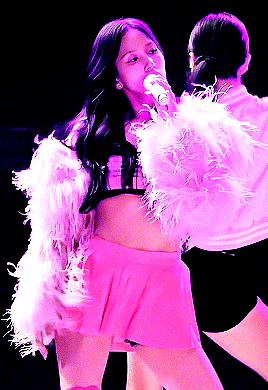
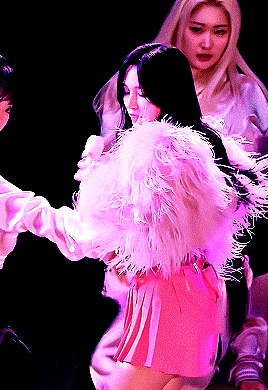
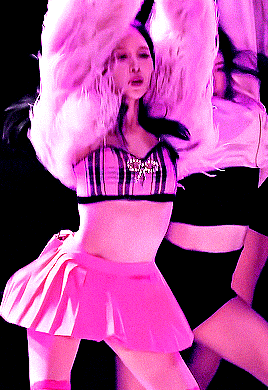

MINA
7 RINGS, 230415
#twice#mina#fortwice#femaleidolsedit#femaleidol#femadolsedit#kgoddesses#dazzlingidolsedit#99#09#gifs#*p#*#flashing#twicedit#*1k#PEOPLE BE CIVIL IN THE TAGS
2K notes
·
View notes
Text

:C
#ganondoodles#art#zelda#tloz#totk#totk spoilers#a lil?#i wanted to actually do something#i was so sad it just gets solved like that#anyway i have revoked twitter rights to my meme comics#tumblr is so much more civil#i actually had to block some people over the previous one bc they got so mad at me over there
1K notes
·
View notes
Text
i. about 2 weeks ago, i was told there's a good chance that in 5 or so years, i'll need a wheelchair.
ii. okay. i loved harry potter as a kid. i have a hypothesis about this to be honest - why people still kind of like it. it's that she got very lucky. she managed to make a cross-generational hit. it was something shared for both parents and kids. it was right at the start of a huge cultural shift from pre to post-internet. i genuinely think many people were just seeking community; not her writing. it was a nice shorthand to create connection. which is a long way of saying - she didn't build this legacy, we built it for her. she got lucky, just once. that's all.
iii. to be real with you, i still struggle with identifying as someone with a disability, which is wild, especially given the ways my life has changed. i always come up against internalized ableism and shame - convinced even right now that i'm faking it for attention. i passed out in a grocery store recently. i hit my head on the shelves while i went down.
iv. he raises his eyebrows while he sends me a look. her most recent new book has POTS featured in it. okay, i say. i already don't like where this is going. we both take another bite of ramen. it is a trait of the villain, he says. we both roll our eyes about it.
v. so one of the things about being nonbinary but previously super into harry potter is that i super hate jk rowling. but it is also not good for my mental health to regret any form of joy i engaged with as a kid. i can't punish my young self for being so into the books - it was a passion, and it was how i made most of my friends. everyone knew about it. i felt like everyone had my same joy, my same fixation. as a "weird kid", this sense of belonging resonated with me so loudly that i would have done anything to protect it.
vi. as a present, my parents once took me out of school to go see the second movie. it is an incredibly precious memory: my mom straight-up lying about a dentist appointment. us snickering and sneaking into the weekday matinee. within seven years of this experience, the internet would be a necessity to get my homework finished. the world had permanently changed. harry potter was a relic, a way any of us could hold onto something of the analog.
vii. by sheer luck, the year that i started figuring out the whole gender fluid thing was also the first year people started to point out that she might have some internalized biases. i remember tumblr before that; how often her name was treated as godhood. how harry potter was kind of a word synonymous for "nerdy but cool." i would walk out of that year tasting he/him and they/them; she would walk out snarling and snapping about it.
viii. when i teach older kids creative writing, i usually tell them - so, she did change the face of young adult fiction, there's no denying that. she had a lot more opportunities than many of us will - there were more publishing houses, less push for "virally" popular content creators. but beyond reading another book, we need to write more books. we need to uplift the voices of those who remain unrepresented. we need to push for an exposure to the bigotry baked into the publishing system. and i promise you: you can write better than she ever did. nothing she did was what was magical - it was the way that the community responded to it.
ix. i get home from ramen. three other people have screenshotted the POTS thing and sent it to me. can you fucking believe we're still hearing this shit from her when it's almost twenty-fucking-twenty-three. the villain is notably also popular on tumblr. i just think that's funny. this woman is a billionaire and she's mad that she can't control the opinions of some people on a dying blue site that makes no money. lady, and i mean this - get a fucking life.
x. i am sorry to the kid i was. maybe the kid you were too. none of us deserved to see something like this ruined. that thing used to be precious to me. and now - all those good times; measured into dust.
/// 9.6.2022 // FUCKING AGAIN, JK? Are you fucking kidding me?
#witches and wizards#kids need to be able to play games without knowing the extended universe#playing was easy#i knew i wasn't gonna be able to explain chronicles of christomancy#but we could pick up a stick and run around#nd say we were magic that would be enough backstory#and i think the last time i felt that sense of community#was the summer of pokemon go#it's about cross-generational connectivity bro#yes there are insular communtities but EVERYONE had fucking read harry potter#which is me saying - i think maybe people don't miss HER or the ACTUAL BOOK tbh#they miss... feeling connected#think about how so many people felt so weirdly ashamed and lost after Game of Thrones ended -#they did SUCH a bad job that the entire community just... vanished.#where beforehand people would have GoT weddings#we are just animals who love stories and love feeling like we speak the same language#btw i am not on twitter so i hadn't seen some of the shit she was doing#and then when i was 19 she published the ''american school'' hogwarts stuff#and was reading it casually bc again a huge nerd#and in it shes like ''the british taught the natives their more civilized magics''#and that was like..................... oh okay. okay. so.....
6K notes
·
View notes
Text
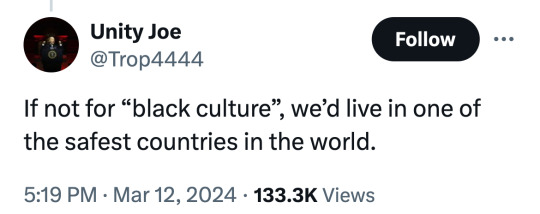


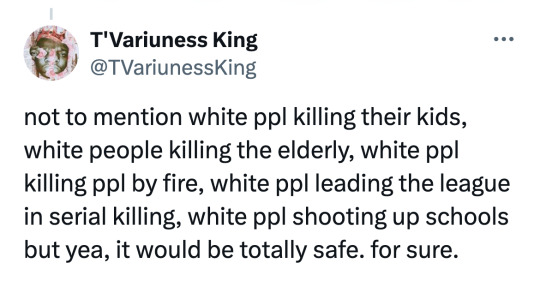
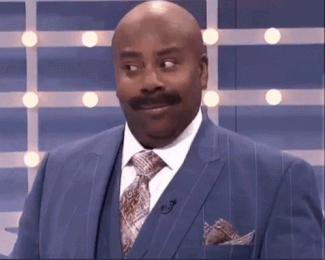
#racism#discrimination#racial inequality#social justice#civil rights#systemic racism#racial bias#racial prejudice#racial discrimination#racial justice#twitter#stupid people
291 notes
·
View notes
Photo
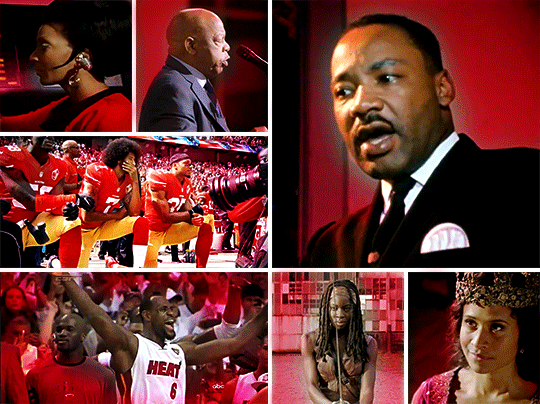
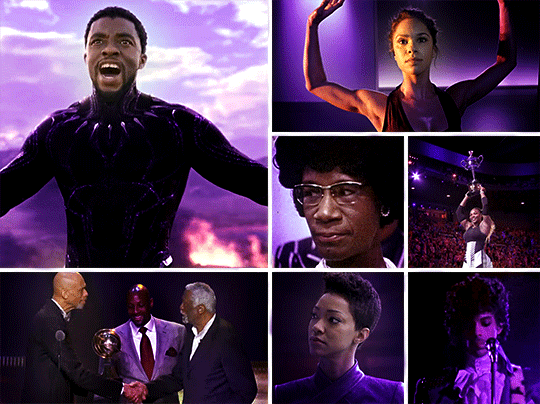
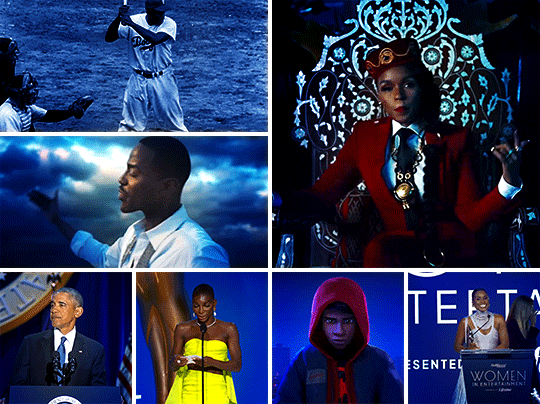
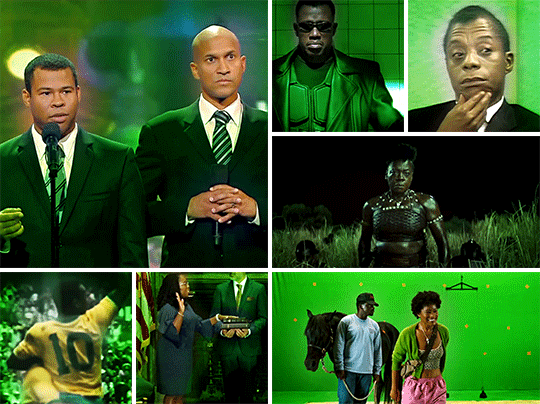
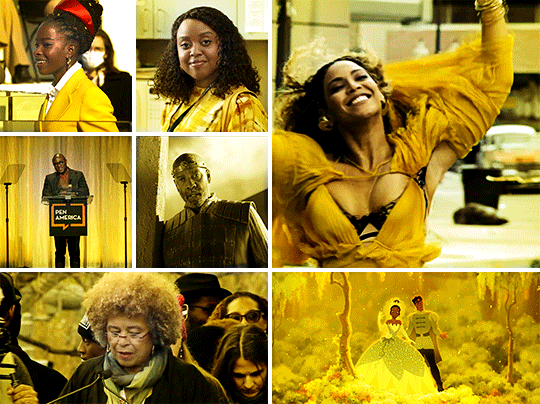
Happy Black History Month!
#black history month#black history#bhm2023#black history month 2023#beyonce#black panther#jordan peele#janelle monae#martin luther king jr#chadwick boseman#represenation matters#civil rights movement#black lives matter#tried to make this one more about actual people than fictional characters#add more if you want!#my graphics
2K notes
·
View notes
Text
This is a big deal. No, $48,692.05 is in no way, shape or form a fair price for the many thousands of acres of traditional Chinook land that were never ceded but were taken by settlers anyway. However, the fact that this funding from the 1970 Indian Claims Commission settlement is being released to the tribe is the strongest move toward regaining recognition in years.
As a bit of background, the Chinook Indian Nation are some of the descendants of many indigenous communities who have lived in the Columbia-Pacific region and along the Columbia to the modern-day Dalles since time immemorial. They saw the arrival of the Lewis & Clark party to the Pacific Ocean in 1805, but shortly thereafter were devastated by waves of diseases like malaria and smallpox. The survivors signed a treaty to give up most of their land in 1851, but it was never ratified by the United States government. While some Chinookan people are currently part of federally recognized tribes such as the Yakama Nation, the Confederated Tribes of the Warm Springs Reservation, and the Confederated Tribes of the Grand Ronde Reservation, the Chinook Indian Nation--comprised of the Lower Chinook, Clatsop, Cathlamet, Willapa, and Wahkiakum--have remained largely unrecognized.
That changed briefly in 2001. On January 3 of that year, the Department of the Interior under the Clinton administration formally recognized the Chinook Indian Nation. In July 2002, the Bush administration revoked the federal recognition after complaints from the Quinault Indian Nation, as the Chinook would have had access to certain areas of what is now the Quinault reservation. This meant that the Chinook, once again, were denied funding and other resources given to federally recognized tribes, to include crucial healthcare funding during the COVID-19 pandemic.
The Chinook Indian Nation has been fighting legal battles to regain federal recognition ever since the revocation. The funding released to them in this month's court decision doesn't make them federally recognized, but it is a show of legitimacy in a tangled, opaque system that indigenous people across the United States have had to contend with for many decades. Here's hoping this is a crack in the wall keeping the Chinook from recognition, and that they get more good news soon.
#Chinook Indian Nation#Chinook#Chinookan people#indigenous people#indigenous Americans#indigenous rights#landback#federal recognition#Bureau of Indian Affairs#Native American#Native American rights#civil rights#United States
323 notes
·
View notes
Text
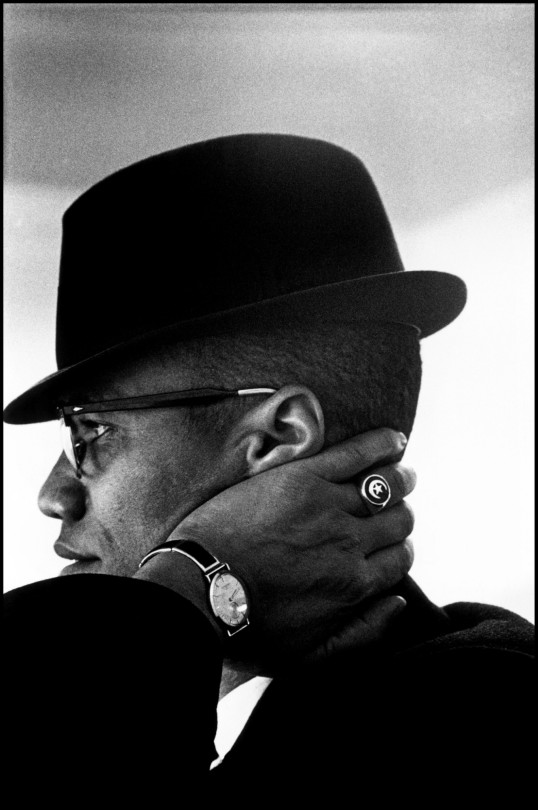
Malcolm X, 1961, Chicago by Eve Arnold.
#1960s#eve arnold#photography#malcolm x#black history#islam#black pride#muslim#civil rights#blm#style#b&w#jazz#hip hop#people#black excellence#culture#60s#fashion#black tumblr#📚
999 notes
·
View notes
Text
I was rereading the correspondence included in Pride and Prejudice, and I'm always amused by the "Yours, etc." used at the end of several of the letters simply because it was too much work to write it out the sign off in full. But what really gets me is that Mr. Collins letter to Mr. Bennet at Lydia's elopement is the only one to end with:
"I am, dear sir," etc., etc.
Like Austen is physically tapping you on the shoulder, going: "look, I'm not going to write out any of these commonplace civilities, but I do need you to know that Mr. Collins uses much much more of them"
#pride and prejudice#jane austen#austen#sunfreckle's scribbles#there is one other double 'etc.' in the novel#to indicate that Bingley is Very Very Civil and profuse in regretting that he has to decline an invitation to dinner#and that he'd love to come at any other time#because apparantly there are no people so verbose as a bingley in love and a collins keeping up a correspondence
220 notes
·
View notes
Text
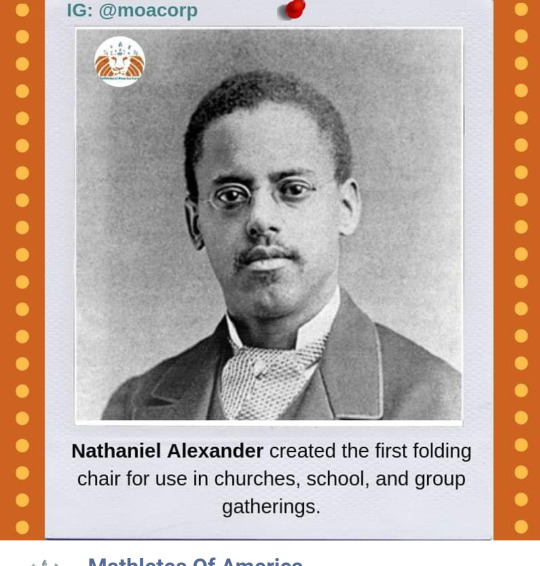
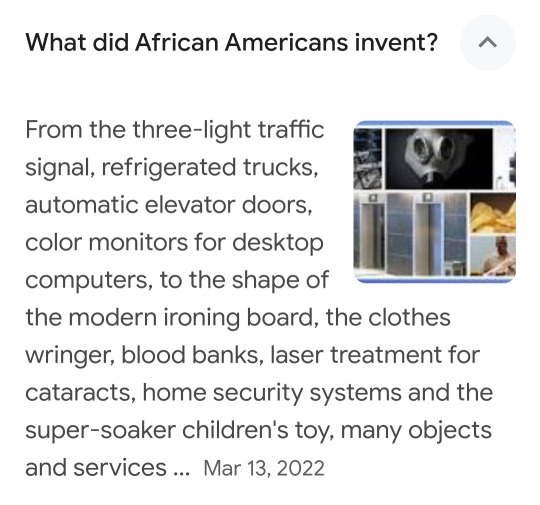

#black history#black tumblr#black literature#black excellence#black community#civil rights#blackexcellence365#black history is american history#black americans#americans#equal#equality#black pride#black people#black history month#all black everything#black archives#black culture#black lives matter
1K notes
·
View notes